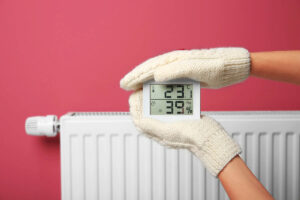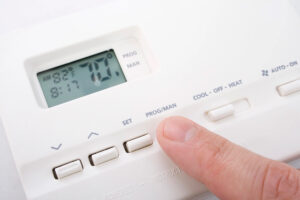An unpleasant odor coming from your HVAC is annoying, but it can also be a sign of an underlying issue with your system that can negatively affect both your home’s indoor air quality and your health.
What can cause a musty smell from your HVAC? Usually, the culprit for the musty, dank odor from your HVAC system is mold and mildew, which thrive in dark, moist places. We’ll look at some ways you can identify problem spots and how you can address the issue effectively to breathe cleaner, fresher air.
Let’s discuss the causes and solutions for unpleasant odors coming from your HVAC.
Musty HVAC Smells and Health Hazards
Mold and mildew spores, dust and other pathogens circulated by HVAC systems cause poor indoor air quality that can exacerbate allergies, asthma and other respiratory conditions. Prolonged exposure may lead to chronic issues like sinus infections or bronchitis. Children and elderly individuals, and those who are immunocompromised, are particularly at risk.
Common Causes of Musty HVAC
- Dirty Evaporator Coil – Your AC unit’s evaporator coil, which cools warm air, tends to attract dust and moisture, creating an excellent environment for mold and mildew growth. Signs of a problem include weak airflow and ice buildup on the coil.
- Clogged Condensate Drain Line – Moisture from the evaporator coil drains through a tube called a condensate drain line. If it’s clogged by dirt or algae, stagnant water will puddle underneath it, leading to mold and mildew growth and odors.
- Leaky Air Ducts – Leaks in ducts located in attics or crawl spaces can pull in humid, mold-spore-filled air, contaminating your HVAC system and circulating musty smells throughout your home.
- Dirty Air Filters – A clogged air filter restricts airflow, trapping excess moisture and the organic debris that mold feeds on. This can cause odors when the HVAC starts up.
- Excess Moisture in Ducts/Vents – High humidity levels and condensation in your ductwork can create a constantly damp environment, encouraging mold, mildew and microbial growth.
Practical DIY HVAC Odor Solutions
- Replace Air Filters – A good rule of thumb is to change the air filter in your AC unit every 1–3 months. However, if you have pets, a lot of foot traffic in your home, or if it’s a dusty environment, you may need to replace it more often.
- Clean the Condensate Drain Line – Make sure your evaporator drain line is free of obstructions. For extra measure, pour some bleach through it to kill mold and mildew spores, and bacteria.
- Use Baking Soda – Baking soda is a great odor absorber. Place an open box in ducts to neutralize odors, similar to deodorizing a refrigerator.
- Seal Duct Leaks – Use foil tape or mastic sealant, available at hardware stores, to seal up around seams and holes to prevent humid air from entering the system.
- Clean Evaporator Coils – Remove any ice buildup and apply a commercial coil cleaner to remove dust and debris along with spores. Coils are fragile, so be careful to avoid damaging them.
How to Keep Your HVAC Smelling Fresh
- Schedule Annual Maintenance – The best way to keep your HVAC in tip-top condition is to have a yearly inspection and routine maintenance performed by a professional. An HVAC technician will clean your coils, check refrigerant levels and inspect your ductwork, among other things.
- Control Humidity – Preventing moisture buildup will help prevent mold and mildew growth. Use a dehumidifier to keep indoor humidity between 30–50%.
- Upgrade Filters – Opt for HEPA filters to capture smaller particles and reduce organic debris. They’re a bit more expensive but worth it, especially for people with allergies or respiratory issues.
- Install UV Air Purifiers – These UV Air Purifier systems kill mold spores and bacteria in ducts and will greatly improve your indoor air quality.
- Ensure Proper Ventilation – Use exhaust fans in bathrooms/kitchens to reduce dust and moisture accumulation.
When to Call a Professional HVAC Technician
If you’re still getting musty, foul odors emanating from your HVAC system after you’ve performed all the routine maintenance outlined above and taken the preventive measures, it’s time to request the assistance of your local heating and air conditioning contractor.
This is especially true if you’re smelling a sweet chemical odor, which could indicate a refrigerant leak, or if you see visible mold and mildew in your vents or near the indoor unit. They’ll be able to do a deep cleaning of your system, install UV germicidal lamps if necessary, and repair any damaged or malfunctioning components that could be contributing to the smell. An inspection and routine maintenance by a licensed professional will also keep your warranties in good order if you have to file a claim.
Musty HVAC: A Warning Sign You Shouldn’t Ignore
A musty HVAC smell is a red flag for moisture and mold issues that demand prompt attention. While DIY fixes can address minor problems, persistent odors often require professional intervention. Regular maintenance and humidity control are key to ensuring your home’s indoor air remains fresh and safe.
If you’re still wondering what can cause a musty smell from your HVAC and what to do about it, trust the experts at Apex Air. Contact us today to schedule an appointment.



